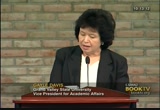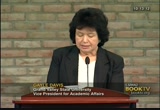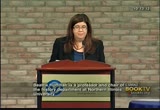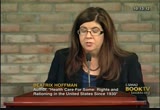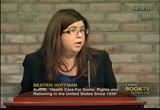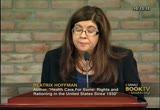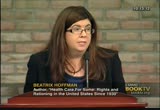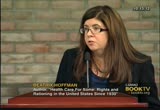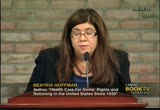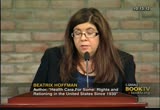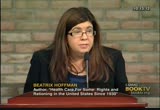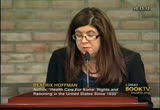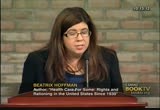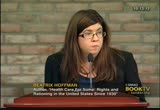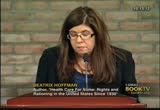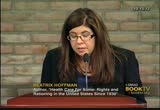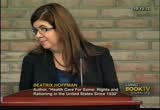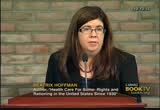tv Book TV CSPAN December 8, 2012 8:00am-9:00am EST
8:00 am
8:01 am
king i think a writers institute is something that is very important within the culture. we are a culture of words, of voices, words are key to our imagination, our capacity to envision things, we ourselves are not completely tied to print on the page senses of writing, but i think that there is no other art form so readily accessible other than perhaps film which we work with too, but it is -- there is something in literature that just captures the human spirit.
8:02 am
>> this weekend join booktv, american history tv and c-span's local content vehicles as we look behind the scenes at the history of literary life of new york's capital city albany today at noon eastern on booktv on c-span2 and sunday at 5:00 p.m. on american history tv on c-span2 -- un c-span3. >> up next beatrix hoffman presented history of the american health-care system. she presents her thoughts on why the united states has been one of the few developed countries to not adopt universal health care. and examines why the issue is so divisive. this is just under an hour. >> hello, everyone. i am gayle davis, provost and vice president of academic student affairs and former faculty member of women's studies of women's history. i am delighted to be here and happy that we are sponsoring
8:03 am
this program. thank you to all of you and thank you for the nice introduction. it is really going to be the best of all pleasures to introduce dr. beatrix hoffman to you. she is a leading historian of u.s. health care system. i bet you have been very busy during this political season. with the debate about what is best in health care, what is best in health care insurance, what is best for women's health-care rights, being in the air everywhere we look. as a person addicted to both politics and academic and women's history, i and i'm sure all of us are interested in this presentation so thanks for being here. you couldn't be in a better counter this talky their since much of grand rapids has been
8:04 am
very highly invested in the health-care industry, hoping to develop stellar health education, research, innovation in practice, all in the quest for great health-care you. i hope you will be able to see what we call health-care in michigan where so much investment in medical health related work has been made. beatrix hoffman is chair of history at northern illinois. she completed her ph.d. as everyone at my table did at rutgers university in 1996. she has written extensively on the history of american health care reform including a 2001 book entitled the wages of sickness, the politics of health insurance, in progress of america at the university of north carolina.
8:05 am
in her talk today she is going to speak about her latest book, the book titled is "health care for some". i have the feeling it is relevant to our times. the talk is entitled health care for all, women, activism and women's right to health. this is a history -- her book rather and her talk today will be partly, a history of rights and rationing in the united states from the great depression to the present, and the book just came out by the university of chicago press. i have seen copies of it lying around. vile accounts, beatrix hoffman has simply nailed this big historical topic of to the present moment. i am going to read from the early reviews of the book just to give you a sense of how that is being received. t. r. reid, author of the
8:06 am
healing of america, right this. in the american political debate everybody can -- the notion of rationing health care. beatrix hoffman's meticulous history shows that rationing by income, age, employment, etc. has been and remains a central element of america's medical system. demonstrates that various attempts at reform over the decades have kept the rationing mechanism firmly in place. i wonder, do you think she will talk about death panel too? i don't know. the author of the political life of medicare rights this -- excuse me. my allergies are showing up. beatrice huffman skillfully chronicles america's struggle to make health care a right from the depression's through obamacare. her beautifully written account explores the pervasive rationing
8:07 am
of medical care and insurance in our staggeringly unequal health system. healthcare for some is the compelling reminder of how far we have come but also how far we still have to go. the reviews keep this tone throughout, beautifully written, insightfully described, throwing research. this book is a must read. thank you so much for your work. i know we are all in for a treat right now so let me get out of the way, join me in welcoming beatrix hoffman to this age. [applause] >> thank you so much for that really kind introduction. i am honored. i want to thank the conference organizers for inviting me here
8:08 am
today. in july of 1938 the roosevelt administration organize a national conference on health care reform. the great depression had been going on for nearly a decade. fdr had signed the social security act and fair labor standards act into law but the united states still had no national program for addressing the health needs of the people. the 1938 health conference was the beginning of something different. instead of inviting only doctors to speak, the conference for the first time included members of labor unions, farm groups and civil rights organizations. included representative not just of the medical profession but of the people who need it and use health care.
8:09 am
a woman named florence greenberg traveled from chicago, illinois to washington to offer her testimony. she was a member of the women's auxiliary of the steelworkers organizing committee, spending her days working in communities around the steel mills. greenberg told the audience at the national health conference that she had come to offer them a different picture of chicago. just steps away from the comfortable headquarters of the american medical association, tenements, a 6 chicago where people struggled with terrible health conditions related to poverty and unemployment and struggled to obtain basic medical care. greenberg told the conference of the grossly overcrowded county hospital, the city's only public hospital with local describes as
8:10 am
a death house, a single overcrowded private hospital served the entire african-american community of the south side. chicago's outpatient clinics were filled to bursting. greenberg spoke of people too 6 to leave their homes but couldn't get a doctor to visit them or couldn't afford the two pennies for transportation to a clinic. she told the audience about a child's with double pneumonia who had died of an abscessed long after being turned out of a hospital because the relief agency would no longer pay for care. on behalf of the working people of chicago, florence greenberg made the following demand -- we are asking our government to take health from the list of luxury to be bought only with money and add it to the list containing inalienable rights of
8:11 am
every citizen. we don't know whether franklin roosevelt ever heard about florence greenberg's unprecedented call for health care as a right. even though he had endorsed the conference, he chose to go on vacation. fdr was actually on a cruise. i guess we can't really blame him, pretty well deserved vacation the three years earlier, fdr had refused to include medical coverage as part of the social security act because he did not want to antagonize the american medical profession. he did send a message of support to the conference but not long afterward the outbreak of world war ii force the president's attention elsewhere. five years later on january 11th, 1944, in his state of the union address roosevelt spoke to the american people about the war and especially about the kind of peace the
8:12 am
allies planned to establish after the defeat of fascism. one supreme objective for the future can be summed up in one word, security. and that means not only physical security which provide safety from attacks by aggressors, but also economic security and social security. the individual political rights upon which the united states enveloped roosevelt argued when necessary but not sufficient to guarantee true freedom and security. fdr announced an economic bill of rights which is sometimes called the second bill of rights that included the right to a job and a living wage, the right to housing, education and security in old age and a right to adequate medical care and the opportunity to achieve and enjoy good health. so even though fdr missed
8:13 am
hearing florence greenberg's speech we hear echoes of it in his second bill of rights. the idea of economic and social rights is essential supplement to political rights, starting as far back as the french revolution, the right to medical care was something more recent. discussion of this kind of right became common in the 1930s and 40s first of all because medical care itself was becoming more effective and starting to matter much more in everyone's lives. the public knew about medical miracles like vaccinations, penicillin, antiseptic surgery, treatments that could save lives and even extend life. to withhold these miracles came to seem unjust. medical care at this time was also starting to cost more than ever before. the average family could not
8:14 am
afford to pay for hospital stay for a major illness or the birth of a child out of their wages. medical care had become not just a matter of life and health, it was becoming something that could cause serious financial hardship. that is what medical care became a matter of economic security as well as health security. in the u.s. demand for medical care as a social right originated in the workers' movement represented by people like florence greenberg. next came to national prominence in fdr's proposed second bill of rights and finally they were adopted in the united nations universal declaration of human rights after world war ii thanks in part to eleanor roosevelt who helped draft the un declaration after her husband's death.
8:15 am
today more than 70 countries recognize a right to health or health care in their constitution. virtually every industrialized nation has taken steps to implement these rights by establishing some type of universal health coverage for their citizens with one major exception. anybody know? the united states of america. it is not for lack of trying. after fdr's death, president harry truman announced a national health insurance program that would have made medical coverage for all part of the social security act but the physicians of the american medical association attacked the plan as socialized medicine. that might also sound familiar. in the early cold war the a m a won that battle and truman's proposal. other presidents including
8:16 am
richard nixon and bill clinton tried to pass universal health care programs but they failed due to entrench and vigorous opposition from not just medical professionals opposition from business and increasingly powerful insurance industry. health-care reform in the u.s. was pronounced impossible but then the impossible happened and sedate we have the 2010 affordable care act or obamacare which everyone is calling it now. does the passage of the affordable care act mean we now have a right to health care? in the united states? the answer is not really. there are some important victories. the biggest one is the ban on insurance companies being able to exclude people from coverage because they have preexisting
8:17 am
health conditions. the affordable care act will expand access to health coverage by providing federal subsidies for people who can't afford insurance on their own but even when the law is fully implemented if the law is fully implemented there will still be a lot of people without health insurance, estimated to be up to thirty million remaining uninsured, and this estimate became higher than originally projected because of the supreme court decision last summer which will allow states to opt out of expanding medicaid. and although the affordable care act creates some new rights there is no universal right to medical care in america. with one major exception and that is the right to be seen in an emergency room which is something we have been hearing a
8:18 am
lot about recently. but a right to emergency care is not the same thing, it is not a substitute for a system that takes care of people's help and protect their economic security. so why? why is this the case? what has made the united states and outlying nation when it comes to the right to health care? i have been studying this question for a very long time. i am sorry to say, historians will not be surprised to hear this, there's no single answer. my book, "health care for some," tries to provide a few of the answers by analyzing the history of this country's long tradition of unequal access to health care. for the next thing i'm going to talk about, the book's arguments, then give a couple more examples of women activists who have challenged the american
8:19 am
system of unequal access. finnerty subtitle of the book, "health care for some: rights and rationing in the united states since 1930," i have talked about rights and how americans don't really have them when a comes to health-care. in political argument you will often hear that the u.s. may have a lot of problems with its health system but at least we don't ration the way europeans and canadians do. you may have heard the arguments that universal health care means a government bureaucrat will deny you life-saving treatment in order to save money for the system. we still hear some people insisting that reform will lead to death panels and during the first presidential debate mitt romney warned of an unelected board that will deny treatment
8:20 am
under obamacare. not only are these claims misleading at best but they also imply that rationing or the denial of health care would be something new to our system, something extremely un-american but i believe the claim that the u.s. does not terribly ration health care has been counterproductive, damaging and inaccurate. my book uses historical evidence to show that the u.s. has rationed health care for long time. not the way europeans are canadians do for things like official waiting lists for caps on national health expenses but this country has allocated and denied health care in a complex and unique way that i call the american way of rationing. what is the american way of rationing? how can history help us
8:21 am
understand it? in classical economics, rationing simply means goods and services are distributed by price. in other words not everybody can afford everything they possibly want or need. so supply and demand are controlled by people's ability to pay. rationing by price or by the market goes a long way to describe the u.s. health care delivery system. the government may not officially deny you health-care but many americans cannot get the care their need because they can't afford it. in the u.s. health system until 1986 it was legal for hospitals to turn away patients because they could not pay. that is still true in the case of non emergency conditions. we have a huge number of studies showing economic barriers lead to people not being able to obtain primary and preventive care and even lead to reduced life expectancy.
8:22 am
so the u.s. rations health care based on the ability to pay. people without health insurance have trouble getting care or don't get it at all with severe consequences to their health but that is not the whole story of the american way of rationing. i show in my book that the u.s. has rationed health care in many other ways, by race, by region or location, by type of insurance coverage, by health conditions, by age, by marital or parental status, by gender, the list actually goes on. i will give a few examples from history of these types of rationing starting with race. you are probably all aware that jim crow system existed in health care as it did elsewhere in the south. did you know that a separate and
8:23 am
for unequal hospital system was built and paid for with federal funding? in 1946, allocated billions in federal dollars to expand u.s. hospitals after world war ii included a special provision allowing southern hospitals to separate black and white patients. there are cases of patients dying and women giving birth and hospital parking lots because the segregated black section of the hospital was full even if there was room in the white section. in the north there was another kind of rationing by race. in chicago and many other northern cities ambulances would take african-american emergency patients to the public hospital. pfft even if the private hospital was much closer. people died because of this practice. even after official discrimination was outlawed
8:24 am
other types of rationing by race continued. for example, hospitals in inner-city neighborhoods to mostly white suburbs. instead of universal health care we developed a system of private health insurance provided the benefit of employment and supported by the federal tax code and this is still how most americans get their health care today. health coverage. so insurance coverage and access to health care depends on whether you are employed and where you are employed, whether your employer chooses or is able to provide health benefits and what kind and how much cost your employer is willing or able to
8:25 am
cover. a system based on employer health coverage excludes a lot of people. people who look for smaller employers, the unemployed, women who temporarily leave the workforce to have children and the retired don't have access to insurance. rationing by employment means people who retire lose health coverage at a time they will probably start to need it the most. it was this flaw in the and women based health system that led to the creation of medicare in 1965. medicare itself is a system of rationing by age. there's no logical reason to give all people over 65 a completely different kind of health coverage than people under 65 but that is the way the health system evolved, creating incremental programs to try to
8:26 am
cover the gap. and we have another completely different system for the poor. medicaid, which fractions by one of the most ancient methods of all, the means test, a test that determines if you are poor enough to be eligible for the program. how old you are, how poor you are, where you work, and of course how much money you have. the answers to these questions determine what kind of health coverage and care are available in the health-care system if any is available to you at all. do we still think the u.s. doesn't ration? we have entirely separate health care systems for veterans and native americans. we have public and private hospitals, doctors who accept medicaid or refuse medicaid, doctors and hospitals in the network or out of the network, access to care that is based not
8:27 am
on how sick you are but how much insurance you have, the right to care in emergency room but not in a doctor's office. people getting too much medical care ridge people unable to see a doctor at all. the american way of rationing is complicated, it is confusing and it is very irrational. when you add it all up, this kind of rationing leads to a system that is the most expensive in the world. in the u.s. will spend $8,000 per person on health care each year. nearly twice as much as canada and germany. more than twice as much as britain and japan. rationing is supposed to be the lower cost, the american way of rationing costs more. what do we get for all that money? 41 countries have higher average
8:28 am
life expectancy. 40 countries have a lower infant mortality rate than we do. we have one of the poorest records of actually curing people of curable diseases in the western world. of our spending still leaves millions without health coverage. does the affordable care act continue or does it disrupted the american way of rationing? i could say it does a little bit of both, but at 2500 pages that actually does a lot of both. first of all, by requiring insurance companies to accept people with preexisting conditions obamacare strikes a major blow against rationing by health condition. i don't think it is possible to overstate the significance of this because it is telling insurance companies they have to
8:29 am
fundamentally change the way they do business. their job is to cover sick people as well as healthy ones and that is a very big change for the american insurance industry. requiring everyone to buy health insurance or pay a fine, the individual mandate is not exactly a right. more of an obligation. but offering federal subsidies to people who otherwise couldn't afford the insurance those some way toward alleviating rationing of coverage by ability to pay. the law will also reduce rationing on the basis of gender, which i will talk more about a while. there are many important provisions in the act that will tilt the balance toward more preventive care and greater access to primary care. there are also many ways that things will remain the same. the affordable care act as i
8:30 am
said earlier does not create universal coverage. it builds upon and leave fairly intact -- for the employed and unemployed, the young and old, etc.. mean to dismiss the achievement of this reform. it is historic. it brings us closer to universal coverage than anything we had before but doesn't change the system's fundamental nature of separating into many different categories in a way they is a very expensive and in many ways and just. something else i read about in the book is the history of opposition to inequality in the american health care system. there have been a long and
8:31 am
honorable beleaguered opposition. women activists have had a major impact on advancing the right to health care and critiquing the american way of rationing in the past century. you may have heard it was theodore roosevelt who started the health insurance business in the 20th century. but actually it was women garment workers and labor organizers in the 1910s who first joined with progressive reformers for workers. earlier i talked about how of florence greenberg demanded recognition of health care as a right during the great depression and in the time remaining i would like to talk about two other women later in the 20th century who refused to accept the american way of
8:32 am
rationing on health care as a right. we are going to jump ahead three decades after florence greenberg. after the passage of medicare and medicaid to september of 1970 when the american hospital association held its annual meeting in houston, texas. the american hospital association, or the h a, you may have heard of them, they're not as well-known but very powerful lobbying group on behalf of private hospitals in the u.s. for over a century. the 1970 meeting turned out to be unlike any they had ever had before because the hospital delegates were greeted by picket lines of mostly african-american women and children who were
8:33 am
carrying signs and chanting things like equal treatment for medicaid patients and hospital care for the poor. they represented the national welfare rights organization, a grass-roots group with thousands of welfare recipients and who are welfare mothers as they were sometimes called. this meeting of the hospital association in 1970 was the first major action the welfare rights movement campaign to stop discrimination against the port in the health-care system. the welfare mothers demanded to speak to the convention and eventually their request was granted a woman named geraldine smith who was the national rights organization financial secretary got up in front of the convention and made a blistering speech.
8:34 am
she told the audience of hospital lobbyists the american hospital association is hypocritical, selfish, parochial and patronizing and hospitals hide behind a screen of concern for the disadvantaged while perpetuating an unequal system of health care. smith then presented the delegates with a list of demands. she told hospital officials to end the practice of dumping poor and uninsured patients and transferring them in unstable conditions, and establishing clinics where people could attend instead of going to the emergency room. she called for a requirement for all hospitals to accept medicaid patients, demanded patient representatives and members of the community especially of the 4 should have seats on hospital boards. asked for informed consent about medical treatment and especially
8:35 am
that all patients be treated with dignity. supposedly the audience of hospital officials listened politely to all this but when smith finished speaking they went about their business at the convention as if nothing happened. shortly after this meeting the american hospital association began drafting the first patient bill of rights which was eventually adopted by hospitals all over the country. and include crucial rights geraldine smith mentioned such as the right of patients to have informed consent. hospitals also began around this time to include community representative on the governing board. as you might imagine the bill of rights did not resemble what the welfare rights bill of rights was. it did not include any rights to access health-care that
8:36 am
geraldine smith demanded, these bills certainly did not recognize a right to health care but they did represent a turning point, the voices of patients could no longer be ignored. welfare mother's invasion of a hospital meeting in 1970 brought the language of patient's rights into the mainstream health system for the first time. my second example fits well with last night's keynote address, an activist from the flight named olga maddar who started working in auto plants in 1970 and first female member of the united autoworkers. she was one of the first co-founders of the coalition of labor union women and she became a president in 1974. as president of clue, she led the first national campaign
8:37 am
against discrimination against women in the private health-insurance industry. in a speech reported in newspapers around the country she announced insurance companies were charging women premiums as much as 160% higher than men. insurers justified the practice by arguing women have higher health costs. they describe us as clunkers like old cars, we break down. we are unreliable, we're out to defraud and bankrupt the insurance industry. meddar pointed out as well as charging higher premiums the insurance company refused to cover childbirth and pregnancy and offered only minimal coverage at high expense. because of the concept of moral hazard pregnancy and childbirth were considered to be uninsurable conditions because women supposedly planned them in
8:38 am
advance. you are not supposed to buy health insurance knowing you are going to use it. that is what they said. some companies covered maternity but only for the lives of male employees and female workers were denied coverage. in comprehensive coverage of maternity service in the 1970s as late as the 1970s was originally nonexistent. meddar's activism helped lead to a pregnancy discrimination act of 1978 which required large employers to include maternity coverage in their health plans. but like all health reform in the u.s. it only helped some of the population. the small group of individual health insurance markets which were the only option for people not working for large employers
8:39 am
continued to bleed we discriminate against women. until 2012, until this year, a majority of individual health insurance plans charge women more than men. a practice called gender rating. most of these plans even charged with in nonsmokers more than male smokers and the majority of individual insurance plans through this year still excluded maternity coverage. but this year important provisions of the affordable care act been many types of gender discrimination in the insurance market. the law doesn't stop discrimination entirely, abortion services are placed in a special category. the stated condemned abortion coverage altogether. but the law contains many
8:40 am
provisions that seek to end rationing by gender. new health care plans will be required to charge men and women equally and to include coverage for maternity care. since august the first of this year, obamacare requires all health plans to cover without copayment many preventive and premium services for when including mammograms, pap smears, prenatal care like patient support, domestic violence screening, contraception. coverage expansion alongside the definitive end of gender rating and the ban on excluding cases of conditions are the most truly historic aspects of the new law and they will make the greatest inroads against the american way of rationing. we also have to ask why it took so long and why was a difficult,
8:41 am
blatant gender discrimination until 2012, 100 years after progress of women reformers called for equal treatment of maternity in health insurance. as you all know we face an election in which one party vowed to repeal even modest gains for equality in health coverage. the fight for health security in the united states is far from over. all other affluent nations agreed long ago that basic health care should be a right of all citizens the u.s. continues to treat medical care as a product purchased in the marketplace. even now the most sweeping reform in our history embodies tension between the rights of the people and the rights of private companies and individuals to profit from the health care system.
8:42 am
the three women i described in this talk with the different times in different parts of the country. they didn't know each other and never heard of each other. what all three of them had in common was the belief that ordinary citizens could take the lead in preventing a new vision of what the health care system could be. all three of them felt the affordable care despite its flaws, continuing open end participatory national debate about how the american health-care system can best serve the needs of all the people. thank you for listening. [applause] >> we have time for questions.
8:43 am
beatrix hoffman will stay up there and i will come around to the microphone. people just start putting up your hand if you have questions and i will come to you. >> thank you very much for a wonderful talk. i purchased your book and look forward to reading it. hy any recent dean of 4 college, women and gender studies is my program. i am happy to be here. i am very interested in the idea of human rights and have read the book by eleanor roosevelt's
8:44 am
goal in the writing of the universal declaration of human rights. i am wondering to what extent philosophical debate have played a role in the politics of the united states. i would expect not very much. the united states is born out of the philosophy of political philosophy of our country is born out of the enlightenment values and out by our creator on basic rights of the pursuit of happiness, liberty and freedom and this was always at odds with the economic and cultural rights. i am wondering to what extent any of the debate have occurred in our history about what is a human right versus other kinds of civil rights or economic rights. this is a problem that the right to health care is not seen as a
8:45 am
human right, what government may or may not do. >> thank you for defining human rights as opposed to other types of rights. human-rights are intended to transcend citizenship, national borders, etc.. it is true the united states took a different approach especially to economic and social rights as human rights. i am glad you read that book about eleanor roosevelt, but even eleanor roosevelt, are was surprised how strongly she advocated for the inclusion of sold for rights in the u.n. declaration because i expected the u.s. stance to be more focused on individual rights or what we consider negative writes, freedom from oppression and controlled by the state but
8:46 am
both roosevelts were absolutely crucial in including these social rights in the declaration of -- that didn't resonate here. it didn't resonate and there were also organized groups that worked to oppose the acceptance of such rights such as the medical profession. there was a specific campaign to prevent the u.s. from accepting economic and social rights in the 90s that was run by conservative groups. i think there is a lot of ideological resistance to assist -- social rights and also -- those have combined. less than fertile ground for
8:47 am
social rights. >> my questions ends with knowledge of individual resistance to health-care which i grew up in germany so it's hard for me to understand why people even if they have ellises or family members with chronic illnesses why they are opposed to health care that actually helps them. at the individual level americans, wondering if you could comment on that. >> in germany, correct me if i'm wrong, several other european countries there is a principle of solidarity that rings true. that has been very explicit in their political culture and widely accepted even among conservative people that when it comes to things like health, people things -- things people
8:48 am
have no control over, people with social security take precedent so everyone is covered and it is true that individualism has been a very strong force against the acceptance of the idea of solidarity. it is important to know about the concept of solidarity because it made up more nuanced arguments that all they do is want socialism. there's a spectrum and solidarity is a very mainstream concept in europe. at individualism of the day she might see neighbors suffering but maybe it is their fault. maybe they are not eating right or exercising or done something, this is an example of the way individualism can shape the health care debate in this country and that takes form in
8:49 am
the individual mandate of the affordable care act which is not an admission of solidarity or that we are all in this together but individual responsibility and obligation to purchase health insurance. >> i am chris shea, ceo of a federally qualified health center. we are a country of about three hundred ten million people land out of that until very recently about 65 or sixty million of those people did not have coverage. with the affordable care act that number will be down to about forty million people. if we fully implement the affordable care act, if all states choose to have the additional medicaid coverage we could be down to fifteen million
8:50 am
who don't have coverage. -extension of medicaid comes at very low cost to the states involved, the system is already setup in the affordable care act to go into effect to cover those costs. if the states choose to go ahead with that. i find it inconceivable that we could be nine fifteen million more people coverage. i also find it incredible that we are able -- so much to encourage them not to cover those additional people. any comments on that, how it might work out? >> medicaid? i would also like to talk about community health centers.
8:51 am
the affordable care act was intended as you said to drastically reduce the number of uninsured in the country through two different mechanisms so instead of covering everybody, instead of sweeping coverage you have coverage -- people already have and a segment of the uninsured who are not for enough to qualify for medicaid and subject to the individual mandate. and for the poor and up to 133% above the poverty level which is a significant rise in requirements for medicaid to be covered by this expansion, as i mentioned, the expansion once not upheld by the supreme court last summer so even though states can go ahead with it, states are now able to opt out
8:52 am
of it and several of already done so. texas being one of them. we don't want this money even though it is free money for the first several years. so they are saying the states that are refusing this are saying it is going to be something in the long run. hard to imagine there's not some sort of ideological component because it is a no-brainer. is a cheap way of covering a lot more people so now instead of -- i meant to include that with that gap, major, ridge, the medicaid will go down so the gap will be hard to figure. i didn't mention provisions for community health centers in the law. is your center going to be affected at all? there's a lot more money for these types of community-based clinics now.
8:53 am
anything to add? i am curious, is affecting you. [inaudible] >> service considerably with a couple of new clinics including one that is opening up, and so i think one of the other issues besides coverage is the fact that you can have a medicaid card for example, but if there aren't enough other places that accept medicaid coverage, you still don't get care. this is approved vision of the act that allows community health centers and other preventive oriented agencies to open the doors. >> thanks. time for one more question over here and i want to remind people
8:54 am
we have the book for sale and we have another panel to get on to. time for that last question. >> i have a question about the women activists. historians of the midwest, women in vanguard's, this kind of pushing back against what they perceive inestimable treatment, why or why not? >> i didn't do it on purpose. they came to me for the historical record when i wrote my first book on the progressive era health reform, i did expect to be getting a lot about teddy roosevelt. he was in there but it was women farmworkers in new york city starting their own community clinic in new york and they didn't use the language of
8:55 am
rights at the time but they definitely talked in terms of universal, everyone taxes to care, not just those who are unionized or members of unions. is there a gender component? more on the vanguard. in some ways i think there are some connections. the maternity insurance issue have always been a big one. a lot of these critiques of the american way of rationing have been routed in women's experience with health care and the health care needs that women have. maternity coverage, coverage care for children was the impetus behind the 1920s health act. and of course the movement for reproductive rights has at times, i wish more attention were paid to this because it has done this but we hear much less
8:56 am
about our reproductive rights activism is also about health care for all, for every body. there's some much focus on women demanding particular reproductive services, but those types of activism, rooted in experiences have led to a really strong stand on health care rights even though not all women activists would these 9 that the same way. >> going to have to stop there. >> thank you so much. [applause] >> for more information visit the author's web site, beatrix hoffman.com. here is a look at some books being published this week. the chief economist at the hudson institute presents his thoughts on the successes and failures of military leadership in beating talent, how the u.s.
8:57 am
military mismanages great leaders and it is time for revolution. in freedom national:the destruction of slavery in the united states eat in 61-1865 james oakes, history professor at the university of new york argues that slavery was the foremost reason for the civil war. walter bender, charles payne, jody cornish and neil donahue who created to creating one last child presented company history to provide an outline for other social entrepreneur is in learning to change the world, the social impact of one laptop per child. in napoleon:life, legacy and image, a biography, a history professor at the university of york recounts the life of french military leader and emperor napoleon bonaparte. author helen bonham discusses the infectious disease tuberculosis in sitting blood, the history of tuberculosis. look for these titles in bookstores this coming week and watch for our use in the near
8:58 am
future on booktv and on booktv.org. you are watching booktv on c-span2. here is our prime time lineup for tonight. beginning at 7:00 eastern, william silver and former federal reserve chair paul volcker discuss paul volcker's life and career. police chaplain describes circumnavigation. her book is round about the earth. at 10:00 eastern we conclude the prime time programming with our weekly afterwards program. this week dr. marty makary discusses health care reform with richard davis of memorial hospital. this is booktv.org for more on this weekend's television schedule. >> with a month left in 2012 many publications are putting together good bear your end list of notable books. booktv will feature several of these lists focusing on nonfiction selection. these nonfiction titles were included in foreign policy
8:59 am
magazine's must read books. in breakout nations, in pursuit of the next economic miracles, the head of emerging-market in morgan stanley reports on growing economy and a shift in global economic power. senator rand paul of kentucky argues against what he deems far reaching government regulations in government bullies, how everyday americans are being harassed, abused and imprisoned by the fed's. in the new religious intolerance, overcoming the politics of fear. law and ethics professor, at the university of chicago, how to promote religious freedom. novelist and poet, author of things fall apart provides a firsthand account of the nigerian civil war from 1967 to 1970 in there with the country, a personal history of the opera. in the world america made, robert hayden, senior fellow at the brookings institution opines on what the world would
92 Views
IN COLLECTIONS
CSPAN2 Television Archive
Television Archive  Television Archive News Search Service
Television Archive News Search Service 
Uploaded by TV Archive on

 Live Music Archive
Live Music Archive Librivox Free Audio
Librivox Free Audio Metropolitan Museum
Metropolitan Museum Cleveland Museum of Art
Cleveland Museum of Art Internet Arcade
Internet Arcade Console Living Room
Console Living Room Books to Borrow
Books to Borrow Open Library
Open Library TV News
TV News Understanding 9/11
Understanding 9/11



